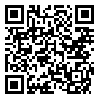Volume 11, Issue 3 (2-2024)
2024, 11(3): 51-61 |
Back to browse issues page
1- Zabol University of Medical Sciences , Iran
Abstract: (359 Views)
Background & Aim: Web-based education is a formal and documented educational program in which the student receives the necessary knowledge and skills through participation in at least one online and distance medium. The purpose of this study is to determine the effect of web-based education on the knowledge, motivation and self-efficacy of nursing students in Zabol University of Medical Sciences about cardiac dysrhythmias.
Methods: This quasi-experimental study with a post-test design was conducted in two classes of 6th semester nursing students (total 39 people) of Zabol University of Medical Sciences. The classes randomly divided into two groups of web-based and traditional education, with educational content (4 sessions of 1 hour) for Both groups were examined for cardiac dysrhythmias. Data collection tools include a researcher-made test to evaluate the level of knowledge, Harter's standard academic motivation questionnaire to evaluate the level of motivation, and a test to analyze the electrocardiogram strip to evaluate the level of self-efficacy between groups and were compared using SPSS and independent t-test.
Results: The average knowledge scores in the intervention group (19.05 ± 2.97) and the control group (18.55 ± 2.97) after training had no statistically significant difference (p=0.536). But after two weeks after the training, there was a statistically significant difference in the average scores of the two groups (p < 0.001. The average motivation scores between the intervention group (111.94 ± 15.95) and the control group (65.8 ± 8.61) also had no statistically significant difference after training (p=0.202). The average self-efficacy scores after training in the students of the intervention group (10.78 ± 1.03) compared to the control group (20.43 ± 1.43) 8) There was a statistically significant difference (p<0.01). This difference was also significant in the test two weeks after the training (0.003).
Methods: This quasi-experimental study with a post-test design was conducted in two classes of 6th semester nursing students (total 39 people) of Zabol University of Medical Sciences. The classes randomly divided into two groups of web-based and traditional education, with educational content (4 sessions of 1 hour) for Both groups were examined for cardiac dysrhythmias. Data collection tools include a researcher-made test to evaluate the level of knowledge, Harter's standard academic motivation questionnaire to evaluate the level of motivation, and a test to analyze the electrocardiogram strip to evaluate the level of self-efficacy between groups and were compared using SPSS and independent t-test.
Results: The average knowledge scores in the intervention group (19.05 ± 2.97) and the control group (18.55 ± 2.97) after training had no statistically significant difference (p=0.536). But after two weeks after the training, there was a statistically significant difference in the average scores of the two groups (p < 0.001. The average motivation scores between the intervention group (111.94 ± 15.95) and the control group (65.8 ± 8.61) also had no statistically significant difference after training (p=0.202). The average self-efficacy scores after training in the students of the intervention group (10.78 ± 1.03) compared to the control group (20.43 ± 1.43) 8) There was a statistically significant difference (p<0.01). This difference was also significant in the test two weeks after the training (0.003).
Type of Study: Research |
Subject:
Special
Received: 2023/11/19 | Accepted: 2024/02/13 | Published: 2024/03/12
Received: 2023/11/19 | Accepted: 2024/02/13 | Published: 2024/03/12
| Rights and permissions | |
 | This work is licensed under a Creative Commons Attribution-NonCommercial 4.0 International License. |



